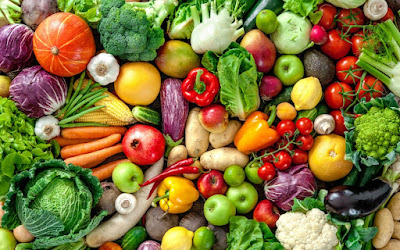Importance of vegetables in our life: 10 good reasons to eat them every day!
*1- VEGETABLES: A LOW-CALORIE FOOD GROUP
The main advantage of vegetables is the fact that they have a very particular composition , namely that they provide very few calories while being very rich in nutrients (I will tell you about this in the following points).
Allow between 20 and 50 calories per 100 gram serving [1]. Thanks to their low energy density, vegetables can be eaten without fear with each meal, whatever the age or the diet, even in the event of weight loss ( provided to take care of the excess of fats which can them. to become heavier).
*2- BUT RICH IN VITAMINS AND MINERALS
Low in calories, of course, but not without interest! Vegetables thus have the advantage of being rich in various nutrients: they are rich in fiber (I will dedicate a specific point to this), in various vitamins and minerals:
Vegetables are an interesting source of vitamins, mainly water-soluble: vitamin C , provitamin A or beta-carotene or even group B vitamins .
They are particularly rich in potassium .
There is also calcium (especially in cabbage), magnesium , iron and copper (leafy vegetables, example: spinach) or sulfur (cabbage, onions, garlic, leeks, turnips, radishes).
*3- THEY'RE OUR MAIN SOURCE OF VITAMIN C
Due to the fact that they are consumed in significant quantities (at least when the recommendations are reached), vegetables represent the main source of vitamin C in our diet . Remember that the latter plays an essential role in our body through its antioxidant and stimulating effect on the immune system.
*4- THEY CONTRIBUTE TO OUR HYDRATION
If vegetables are low in calories, it is thanks to their high water content . Indeed, water is the main constituent of vegetables, representing on average 90% of their composition [1]! They are therefore an excellent way to provide our body with the quantities of water it needs .
Nota Bene: Certain vegetables are particularly rich in water, such as cucumber, salad, radish, endive or even tomato.
*5- THEY PROMOTE DIGESTION
Vegetables are an important source of fiber . These help, among other things, to prevent constipation and maintain good intestinal transit. It should also be remembered that a diet rich in fiber is protective : it helps reduce the risk of developing overweight or certain pathologies (diabetes, cardiovascular diseases or digestive cancers).
The fibers present in plants are mainly composed of cellulose : the latter is known to accelerate transit, hence the known laxative role of certain vegetables. - (Note: cooking and cutting attenuates the laxative effect of cellulose).
*6- THEY IMPROVE OUR ACID-BASE BALANCE
Vegetables are "alkalizing" foods , that is to say, which compensate, partially or totally, the effects of a diet that is too acidic. Remember that to function properly, our body must maintain a certain balance called the acid-base balance system . The latter is measured by the body's pH which must be maintained at an adequate level: it is neither too acidic, nor too alkaline or basic.
Consuming enough vegetables makes it possible to prevent our body from reaching an excessively acidic load and therefore to limit the appearance of diseases linked to an acidifying diet (osteoporosis, kidney stones, hypertension, insulin resistance, stroke, etc. types of cancer, etc.).
*7- THEY ARE BENEFICIAL FOR BONE HEALTH
Dairy products are often thought to be rich in calcium and therefore are the main food group to choose for preventing osteoporosis. However, today, we know that calcium intake is not the only parameter to take into account to take care of our bones. Other nutrients play an important role, such as those found in vegetables.
Vegetables are thus rich in potassium and magnesium, two minerals that enhance the action of calcium on the bones . They are thus just as essential as the calcium intake itself. In addition, remember that the alkalizing effect of vegetables also has a protective effect on our bone density.
*8- THEY BRING SATIETY
Thanks to their high fiber content, vegetables are satiating foods . They provide satiety after the meal thus limiting the risk of snacking between meals .
*9- THEY PROTECT US FROM OXIDATIVE STRESS
Vegetables are an important source of antioxidants , which neutralize free radicals , substances that damage the cells of the body and are responsible for the premature aging of our cells. Vegetables therefore play a powerful role in neutralizing oxidative stress , which is the cause of many degenerative diseases.
*10- THEY BRING DIVERSITY TO OUR PLATES
Vegetables also have a special advantage: their incredible diversity ! No food category is so rich in varieties, aspects and tastes. Imagine that the botanist Desire Bios has identified more than 1353 species [2]!
What also makes them rich is that the varieties of vegetables are specific to each country and to each season . If cereals, meats or fish are accessible all year round, vegetables - themselves - vary according to the year, which makes it possible to avoid a certain monotony on our plates !
It also makes it possible to be served when you don't like vegetables : no excuses, it is quite possible to find something in the middle of all these different varieties!







0 Comments